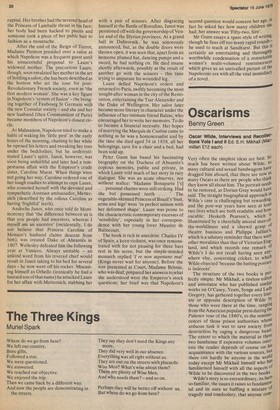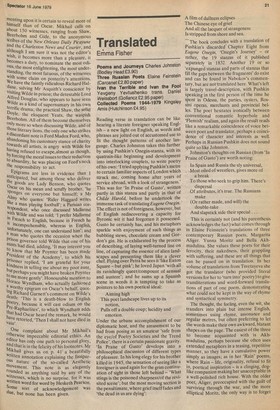Oscarisms
Benny Green
Oscar Wilde, Interviews and Recollections Vole I and II Ed. E.H. Mikhail (Mac" millan £12 each) Very often the simplest ideas are best. So much has been written about Wilde, s° many cultural and sexual bandwagons have dragged him aboard, that there are now as many Oscars as there are people who think they know all about him. The portrait needs to be restored, as Dorian Gray would have said. The straight biographical approach in Wilde's case is challenging but rewarding, and the post-war years have seen at least two lives which are both readable and honourable: Hesketh Pearson's, which jS illuminated by a cheerfully amoral man-ofthe-worldliness and a shrewd grasp of theatre business and Philippe Julliart S. which is a salutary reminder that there were other moralities than that of Victorian England, and which records one remark 01 Wilde's I do not recall having seen anr where else, concerning cricket, to which Wilde objected 'because the batting posture is indecent'.
The structure of the two books is per" fectly simple. Mr Mikhail, a tireless editor and annotator who has published similar works on O'Casey, Yeats, Synge and LadY Gregory, has gathered together every liter' ate or apposite description of Wilde bY those who were there at the time, ranging from the American popular press during the Patience tour of the 1880's, to the reminiscences of those prison authorities whose arduous task it was to save society froill destruction by caging a dangerous beast. The extent to which the material in these two handsome if expensive volumes inter' ests the reader depends of course on his acquaintance with the various sources, bin there can hardly be anyone in the world today except Mr Mikhail himself who llas familiarised himself with all the aspects a Wilde to be discovered in the two books. Wilde's story is so extraordinary, its facts so familiar, the issues it raises so fundamen: tal and its aura so baffling a mixture 01 tragedy and tomfoolery, that anyone cony menting upon it is certain to reveal more of himself than of Oscar. Mikhail calls on about 150 witnesses, ranging from Shaw, Beerbohm and Gide, to the anonymous scribes of the New Orleans Daily Picayune and the Charleston News and Courier, and although I am sure it was not the editor's wish, it becomes more than a pleasure, it becomes a duty, to nominate the most odious, the most enlightening, the most understanding, the most fatuous, of the witnesses With some claim on posterity's attentions. We have the faintly ridiculous Richard Haldane, salving Mr Asquith's conscience by visiting Wilde in prison; the detestable Lord Alfred Douglas,. who appears to have seen Wilde as a kind of supernumary in his own terrific drama; the practical Shaw, the solid Doyle, the eloquent Yeats, the waspish Beerbohm. All of them become themselves °illy more so when discussing Wilde, and of those literary lions, the only one who strikes a discordant note is Ford Madox Ford, who, abandoning his customary stance of charity towards all artists, is angry with Wilde for having refused to escape,almost as though, by forcing the moral issues to their reduction to absurdity, he was placing on Ford's neck the responsibility to act. Epigrams are less in evidence than I anticipated, but among those who deliver the goods are Lady Benson, who quotes Oscar on his mean and scruffy brother, 'he Sponges on everyone but himself; a Mr A brlY who quotes: 'Rider Haggard writes like a man playing football'; a Parisian corIsPondent, who once discussed Mallarme With Wilde and was told; 'I prefer Mallarme in French to English, because in French he IS Incomprehensible, whereas in English, unfortunately, one can understand him'; and a man who quotes the occasion when the Prison governor told Wilde that one of his aunts had died, adding, 'It may interest you to know that Mr Poynter has been made President of the Academy', to which his prisoner replied, 'I am grateful for your kindness in telling me about my poor aunt, but perhaps you might have broken Poynter „„t° me more gently'. Honourable mention to Horace Wyndham, who actually fashioned a worthy epigram on Oscar's behalf, quoting Richard Garnett's comment on Wilde's death: 'This is a death-blow to English ,13oetrY, because it will cast odium on the rre-Raphaelites', to which Wyndham adds that had Oscar heard the remark, he would have retorted, 'Then I shall not have died in vain'.
One complaint about Mr Mikhail's otherwise impeccable editorial ethics. An editor has only one path to personal glory, and that is in the felicity of his footnotes. Mr Mikhail gives us on p. 41 a beautifully written annotation explaining the fissiparous nature of the so-called Aesthetic Movement. This note is as elegantly rounded as anything said by any of the witnesses, which is no surprise, for it was written word for word by Hesketh Pearson. Some sort of acknowledgement was due, but none has been given.



































 Previous page
Previous page